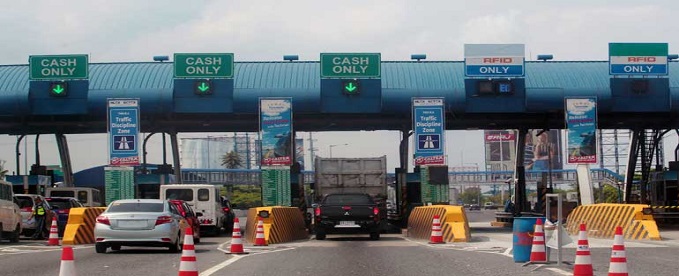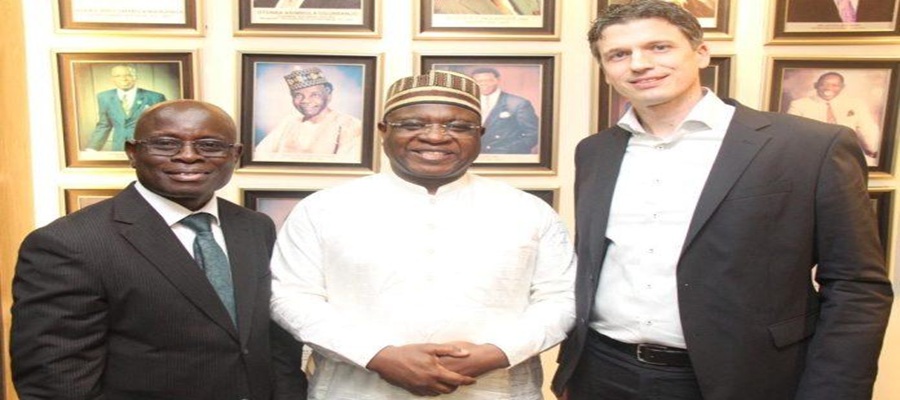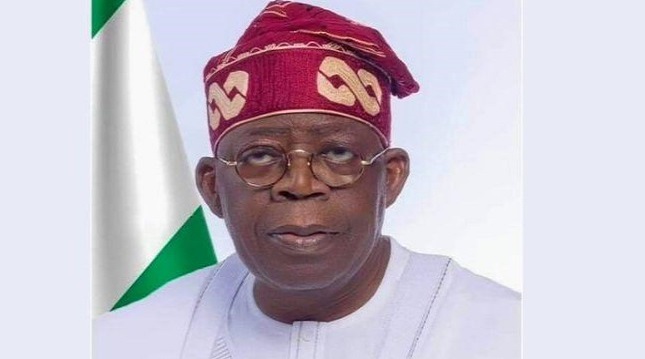News
FG Reintroduces Toll Gates on Highways, Releases Fees for Vehicles

Federal government is now set to reintroduce toll collections on some selected dual carriageways across the country, according to Babatunde Fashola, minister of Works and Housing.

Fashola, disclosed this to State House correspondents after the federal executive council (FEC) meeting presided by vice president Yemi Osinbajo at the Presidential Villa on Wednesday.
According to him, FEC approved for tolling to be reintroduced on dual carriageways of the 35,000 kilometers federal roads.
He added that dual carriageways represent only 5,050 kilometers out of the total 35,000 kilometers.
He said, “the Ministry of Works and Housing presented a policy memorandum for the approval of federal roads, bridges, tolling policy, and also a regulation that will provide the legal framework for the tolling policy.
“You recall that about two years ago, you had asked me several here when roads will be rolled. And I told you, there’s a lot of work. So we have taken another step. So let me be clear, tolls are not going to start tomorrow. So let us be clear about that.
“But the big step to actual tolling was taken today by presenting for approval the broad policy that will guide the tolling so that local people, states, local governments, all those who manage roads, investors who want to come in, will know what our tolling policy is. And that will form the basis of their financial modeling, their investment decision.
“Now, when will it start? First of all, the tolls will not start until roads are motorable. So let’s be clear about those.
“There will be agreements that have to be placed, negotiated with the government through the Ministry of Works and the Infrastructure Concession Regulatory Commission.
“So but the highlights of the policy, I think is what I would like to share. Some of the highlights are that we will adopt an open tolling policy as distinct from a closed tolling policy.
“The difference is that only open tolling policy, which is what we were used to before. you pay to at a barrier over a fixed or predetermined distance. The close toll systems mean that you will pay tolls over the distance you travel and the size of your vehicle. We haven’t operated that before. So we are going back to what we know.”
Stating that the government also approved that consultations must be done, Fashola said willingness to pay surveys must be done before specific roads are tolled.
“We presented and the council approved that only dual carriageways of the 35,000 kilometers should be eligible for tolling by the federal government. And dual carriageways represent only 5,050 kilometers out of 35,000 kilometers.
“So the total network of roads today, assuming we wanted to start today, which we’re not that will be eligible for tolling on the federal network will be 14.3% of the total network. So 85.27% will not be eligible for tooling.
“We have seen that most of those dual carriageways also have alternative roads, but they are single carriageways that’s why we left them. So the only exception to a single carriageway some bridges and they are listed in the regulation,” the Minister added.
He said the ministry also got approval that the toll will be used to maintain roads, to construct new roads as they accrue and also to pay the investors who invest in building or completing a road and then take a concession on it.
According to him, “We will also be going through a process of largely electronic toll collection and management system for audit and transparency. We’ll still have some cash at the very many more and hopefully phased that out as we go ahead.
“We have proposed and council has approved that certain types of vehicles be exempted for paying tolls. Those are bicycles, pedal cycles, try cycles, motorcycles, and other moves have two or three wheeled transport use mainly by disadvantaged members of our community, they will be entitled to a fully 100% exemption, as will be diplomatic vehicles and military and para military vehicles.
“We concede this as a national policy that’s why we’re making very general framework. So that states can also decide subject to their local laws, local government can do their own tolling based on all of these considerations as a broad framework?
“Well, how did we get here? We met with a lot of people, we met with government agencies first of all, but more importantly, we met with private sector and organised labour.
“Nobody that we met with oppose the idea of tolling, at least none of the people that we’ve met with opposed it. Some of people you might wish to know are members of the National Assembly, the Senate, and House of Reps committees oversighting us so that they can take this feedback to their constituents.
“We had consultations with the Office of National Security Advisor, Bureau of Public Enterprises, the Ministry of communication and digital economy, which will be helping us with the electronic and digital aspect of it.
“We also then met with those who are affected by the tolls themselves, Ministry of Transportation, who supervises a part of the transport business and then the road transport employers Association, the National Association of road transport owners (NARTO) and National Union Road transport workers (NUTRW) and Ministry of Trade and Investment, the Federal Competition and Consumer Protection council. These are some of the people who have made very useful input which have been embedded in some policies that I have spoken about.”
Fashola noted that the ministry also recommended that people who live around toll plaza areas will benefit from what is called frequent user discounts so that because they will be mostly impacted, unlike people who just pass once in a while, saying it is global best practice around the world.
“So these are some of the highlights of the of the policy. And then we got his start off toll because certain investment decisions have to be made in the next few weeks.
“You remember I briefly about the HDMI, about the concession about 12 roads, spanning about 1000 plus kilometres. That process has kicked off we have about 70 something applicants who are waiting for a policy. So we need to have a kick off policy. So we’ve classified vehicles into five categories, the cars, the SUVs and the jeeps as a second category.
“Private bus and commercial bus as third and fourth categories. And then luxury buses and trucks as a fifth category.
“So the start off tolls that we have for financial modelling and investment decision making, cars will pay N200, SUVs and Jeeps will pay N300, private busses will pay N300, commercial buses will pay N150, luxury buses and trucks will pay N500.
“Now I think it is important to share with you how we arrived at these prices. Some of these prices were recommended by the operators themselves that I said we met. Some of them were also obtained from a survey we did across the six geopolitical zones, talking to households and talking to people in the garages, motor parks and all of that, which was quite extensive. We covered about 17 or so states or 22 states out of the national framework just to get a sampling of what people felt.
“So in terms of comparison, for example, we also looked at the tolls being paid at Lekki, Ikoyi bridge and the Lagos airport, Abuja airport toll plazas as a basis for further comparison. And in doing that, we found that the N200 for cars for example, is the same as Lekki, Abuja airport Lagos airport but it is N50 cheaper than Lekki-Ikoyi link bridge.
“For the SUVs and Jeeps, ter N300 that we got approval for is the same as Abuja airport and Lagos airport and N100 cheaper than Lekki and Ikoyi toll bridges, those ones charged N400 for jeeps.
“Private bus is same as Lagos airport toll, N100 less than Lekki toll and Abuja airport toll. Commercial bus, which is the cheapest here in sensitivity to the most vulnerable members of our society the rate is not more than N150. This is N50 higher than the Lekki toll, because commercial buses are not frequent in this toll but it is N50 cheaper than the suggestion of the transport unions themselves. And it is equal to the maximum price that the willingness to pay survey picked up from the streets. Luxurious buses N500. This is the same as Lagos airport, but it is N500 cheaper than Lekki N200 more than the maximum gathered from the willingness to pay survey.
“The reason why we have no difficulty with this is because those are the vehicles, they are the heaviest axiel load and inflict the most impactful stress on our pavement.
“So this is the sum and substance broad line and then there is a tolling regulation, which now use regulatory framework to these policy based on the provisions of the Federal Highway Act, that allows the minister responsible for works to issue regulations that define policy of government with regards to roads,” he stated.
News
NGX Unveils Net-Zero Plan for Greener Capital Market

Nigerian Exchange Limited (NGX) has launched the NGX Net-Zero Programme to guide listed companies toward clear carbon reduction pathways and enhanced climate disclosures aligned with global investor standards.

NGX
The high-level launch engaged chief executives of quoted firms alongside development partners including German Investment Corporation KfW, DEG, and African Foresight Group (AFG), NGX’s implementation partner. Issuers and investors discussed financing decarbonisation, sustainability practices, and attracting climate-aligned capital.
NGX Group Chairman Dr Umaru Kwairanga described the initiative as concrete climate action, commending partners for two years of groundwork. “Today marks leadership and decisive action. Climate change has become a core business imperative, with capital markets mobilising capital and setting standards,” Kwairanga said.
He positioned NGX Net-Zero to support emissions measurement, disclosure, capacity building, and sustainable finance access, urging CEOs to embrace it strategically rather than as compliance. Kwairanga reaffirmed NGX’s goal to make Nigeria’s capital market Africa’s green finance hub.
Group CEO Temi Popoola called climate action a business imperative, noting sustainability-embedded firms attract capital, manage risks, and stay competitive. DEG Management Board Member Monika Beck highlighted partnerships scaling impactful, commercially viable climate solutions.
The event closed with a ceremonial gong marking the programme launch and send-off for outgoing DEG Regional Director Bernd Telemann.
News
Nigeria Off EU High-Risk Money Laundering List in Major Financial Win

Nigerian Financial Intelligence Unit (NFIU) has hailed Nigeria’s removal from the European Union’s list of high-risk third countries for Anti-Money Laundering and Countering the Financing of Terrorism (AML/CFT) as a landmark achievement endorsing the nation’s reform efforts.

Nigerian Financial Intelligence Unit (NFIU)
NFIU CEO Hafsat Abubakar Bakari said the delisting, contained in European Commission Delegated Regulation (EU) C (2025) 8460 adopted December 4, 2025 and effective January 29, 2026, affirms sustained AML/CFT and Counter Proliferation Financing (CPF) reforms.
The move follows Nigeria’s exit from the FATF Jurisdictions under Increased Monitoring after addressing strategic deficiencies, alongside Burkina Faso, Mali, Mozambique, South Africa and Tanzania.
Bakari noted the European Commission recognised Nigeria’s strengthened AML/CFT effectiveness, closed technical gaps, and fulfilled FATF Action Plan commitments leading to grey list removal in June and October 2025.
The delisting eliminates enhanced due diligence requirements for EU financial transactions, easing compliance, boosting cross-border flows, and enhancing Nigeria’s appeal for European trade, investment and partnerships.
The NFIU attributed success to President Bola Ahmed Tinubu’s political will and collaboration among National Assembly, law enforcement, regulators, judiciary, private sector and development partners.
The agency reaffirmed commitment to ongoing FATF, GIABA, EU engagement and domestic framework resilience to maintain international confidence in Nigeria’s financial system.
News
FG Directs Banks, Fintechs to Remit VAT on Service Fees

The Federal Government has directed all banks and fintechs to collect and remit 7.5 per cent value-added tax on certain electronic banking services, effective Monday, January 19, 2026, according to an email notice issued by payment platforms.

The VAT will apply to electronic banking charges, including mobile money transfers, USSD transaction fees, and card issuance fees, according to an email notice on Wednesday shared with customers by Moniepoint.
For example, if a bank charges N100 to make a transfer, the 7.5 per cent VAT will be applied to that service fee, not the money being sent.
“From Monday, January 19, 2026, we are required to collect a 7.5 per cent VAT, to be remitted to the Nigerian Revenue Service (formerly known as the Federal Inland Revenue Service).
“VAT will apply to certain banking services that include electronic banking charges such as mobile banking fees (transfers), USSD transaction fees, and card issuance fees,” the email read.
Other operators are expected to issue similar notices to their customers in the coming days. Services that will remain exempt include interest earned on deposits and savings, meaning customers will not pay tax on the returns from their accounts.
The NRS, formerly known as the Federal Inland Revenue Service, has set the deadline to ensure that all commercial banks, microfinance banks, and electronic money operators comply with the collection and remittance requirement.
Moniepoint stressed that this is not a price increase but a statutory obligation. “Moniepoint is required to collect and remit VAT to the Nigerian Revenue Service,” the company said in a statement.
The move is part of the government’s broader efforts to standardise VAT collection on digital financial services and expand revenue generation amid Nigeria’s growing digital economy. VAT on banking transactions is not entirely new; the NRS is now enforcing uniform collection rules across all platforms, ensuring compliance across the sector.
Customers have been assured that the new tax will be clearly itemised, with the VAT shown separately on transaction statements and reports.
In December, several commercial banks informed customers that the N50 stamp duty would be deducted on electronic transfers of N10,000 and above, following the commencement of provisions of the new Tax Act.
The charge, previously known as the EMTL, has now been formally reclassified as stamp duty and will be applied as a one-off fee on qualifying electronic transfers.

 E-Financial3 days ago
E-Financial3 days agoAngst as FG Demands 7.5 Percent VAT on Mobile Bank Transfers, USSD

 News3 days ago
News3 days agoMoniepoint Launches Second Cohort of DreamDevs Initiative to Double Down on Africa’s Tech Talent Pipeline

 E-Financial3 days ago
E-Financial3 days agoThe Missing Pieces in Nigeria’s Banking Recapitalisation

 E-Financial3 days ago
E-Financial3 days agoNGX lists 3.156bn UBA shares, boosting capital to N513Bn

 Telecom3 days ago
Telecom3 days agoGlo Unveils Immersive Gaming Experience, Travel Saga

 E-Financial2 days ago
E-Financial2 days agoPaystack Expands Beyond Payments into Banking

 E-Business3 days ago
E-Business3 days agoHalf of Global Companies Build SOCs to Enhance Cybersecurity, with a Focus on Human Expertise

 General News3 days ago
General News3 days agoNITDA DG Reaffirms Nigeria–U.S. Partnership on Data Privacy, AI and Cybersecurity



























